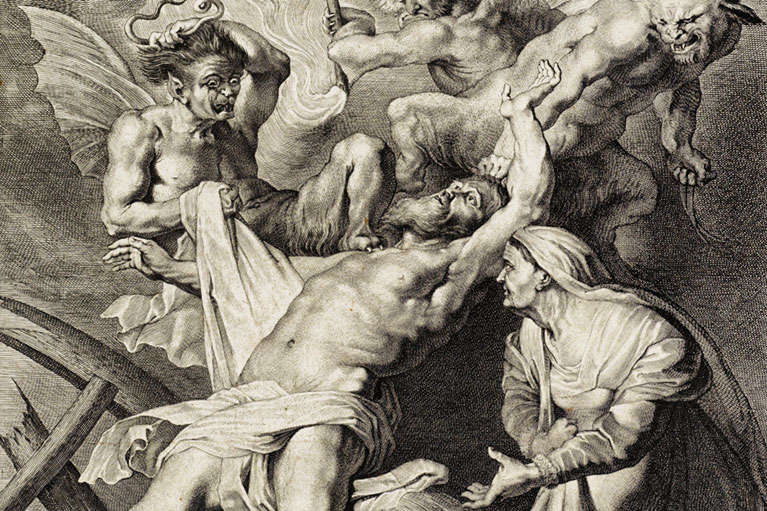
Details from Job plagued by devils, by Lucas Vorsterman (I), after Peter Paul Rubens, 1619-1675, public domain.
I’m 25 years old and I have Desmoplastic Small Round Cell Tumors, a tenacious, rare, and deadly cancer. The last three years of my life have been filled with every sort of cancer treatment available, including dozens of cycles of chemotherapy, numerous surgeries, multiple rounds of radiation, and even experimental clinical trials. It’s been grueling, to say the least. I’m already living on borrowed time, and I have no idea how much more I’ll get.
There’s no good reason for my cancer, and I won’t pretend otherwise. It didn’t happen so I could learn some important lesson, and it isn’t punishment for some sin of mine. My cancer — like a deadly storm or earthquake — is just one of those things that happens when you’re part of an ever-changing world composed of dynamic systems. There doesn’t have to be a clear, palatable, or satisfying answer for why such hardships take place.
I think that’s the main point of the story of Job. Job faces incredible suffering through no fault of his own, though his friends don’t see it that way. They blame Job for his hardships, claiming that if he only repented he would be restored to health and fortune. But Job rebukes such thinking, maintaining his innocence while acknowledging that none are righteous before God. At the end of the story God shows up. God does not reveal to Job a satisfying reason for his suffering. God simply challenges Job, reminding Job of his smallness and insignificance compared to God and all God’s works. God makes it clear that everything afflicting Job is not some divine retribution for misdeeds, nor is it all part of some painful lesson that God has decided Job must learn in the hardest way possible. Job’s hardships simply happened.
It’s not a nice, satisfying answer, but I’ve found that the easier, nicer, and more satisfying an answer, the more exceptions there are to it. Though Job wonders aloud in chapter 21, verse 7, “why do the wicked live on, reach old age, and grow mighty in power?” he never gets an answer. The Book of Job, as I understand it, as much examines the question “why do good things happen to bad people?” as it asks “why do bad things happen to good people?” and the answer to both questions is the same, I think. Perhaps it’s because they just do. The world is filled with variables. Sometimes they simply won’t play out in our favor.
It reminds me of a passage in Chapter 9 of the Gospel according to John when Jesus and his disciples encounter a man with blindness. The disciples ask “who sinned, this man or his parents, that he was born blind?” Jesus refutes their thinking, answering “it was not that this man sinned, or his parents, but that the works of God might be displayed in him” (John 9:3). Like the Book of Job, this doesn’t give us a particularly straightforward or satisfying answer as to why, but it clearly shows us why not.
Ailments and difficulties are not retribution for sin, either ours or our ancestors’. I did not get cancer through some sin of mine, my parents, my grandparents, or beyond. I simply got cancer, just like the man in John was blind from birth through no moral failing of his or anyone else’s, and just as Job suffered great hardships without deserving them as a punishment.
The stories from John 9 and the Book of Job demonstrate that God’s purposes and designs are, ultimately, beyond our reckoning. Whatever answers we invent to life’s toughest questions, we are unable to truly understand except when God grants us wisdom. Many times, things just happen and life is neither just nor fair. Whether or not we like what’s happening in our lives isn’t always relevant, and we make fools of ourselves when we ascribe moral factors to our circumstances.
How has all this helped me deal with my own cancer? It means I haven’t ever blamed myself or God for my cancer, and I haven’t let others do so either. It means that even while I look for lessons to learn, and as God has helped me grow from the life experiences my cancer has given me, I don’t worry that I have cancer just to teach me something or that I’ll always have cancer unless I really learn that lesson well. I don’t waste my time wondering why I have cancer or what reason there is for my illness. The lesson I take from Job and the story of John 9 is that not everything happens for a reason. My cancer — like Job’s suffering, the unnamed man’s blindness, and just about everything else — doesn’t have to have a satisfying reason or a moral cause behind it. My cancer simply is, and blessed be God’s name through it all.
About Morgan Bolt
Morgan Bolt was diagnosed with DSRCT cancer in 2014 at the age of 23. He maintains a blog on Christianity and cancer at cancerousauthor.blogspot.com and recently finished a book on faith, cancer, and culture, for which he is seeking a publisher now. You can find Morgan on Twitter @MorganJBolt and on Facebook at facebook.com/morganboltauthor.